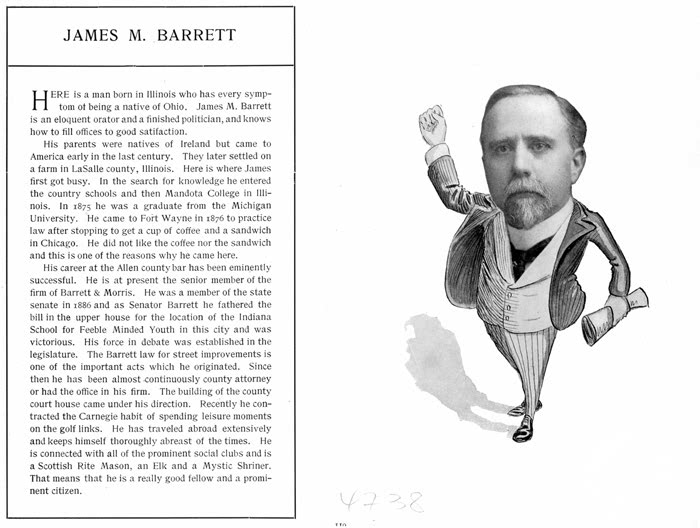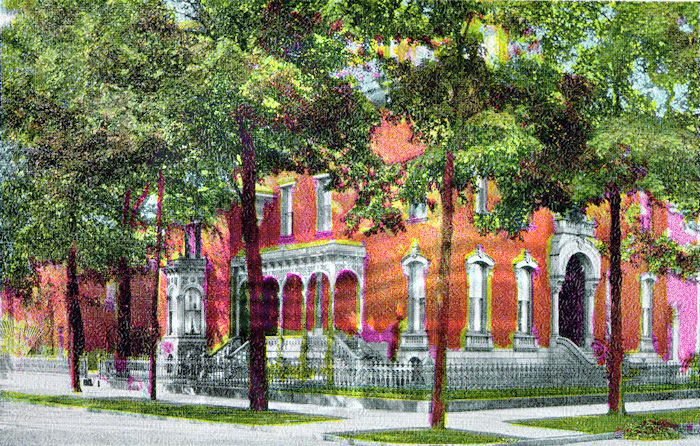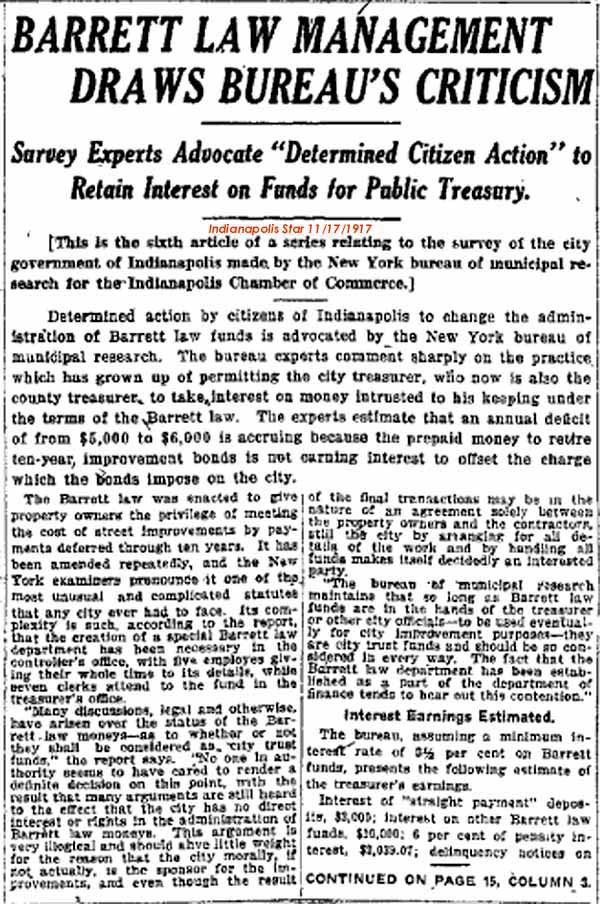![]() Where
is Kryder's Money? | Main Time Line |
Lincoln Bank Heist | Sitemap | The
Standard | Highways of
the Republic
Where
is Kryder's Money? | Main Time Line |
Lincoln Bank Heist | Sitemap | The
Standard | Highways of
the Republic
Fort Wayne Traction Days
Here's to you, James M. Barrett
"He was a member of the state senate in 1886 and as Senator Barrett he fathered the bill in the upper house for the location of the Indiana School for the Feeble Minded Youth in this city (Fort Wayne) and was victorious...The Barrett law for street improvements is one of the important acts which he originated. Since then he has been almost continuously county attorney or had the office in his firm. The building of the county court house came under his direction."

Photo ID: 00004738 Collection: Historic
Photos Notes: James M. Barrett, portrait photograph of head, with drawing of
body. Reproduced from a printed source.
 |
In a street railway case, when Judge O'Rourke delivered a severe arraignment of Cleveland bankers concerning money and bonds fraudulently used, "The Guardian Trust Company of Cleveland, the New York Guarantee and Trust of New York, and the Cleveland bankers were represented by Morris, Barrett, & Morris...Mr. Barrett gave notice that he would ask the judge to revise his findings, and if this was not done, he would ask for a new trial."
|
 |
In 1902 James M. Barrett and Mayor Berghoff (of Fort Wayne) won another victory over the people when the mayor was given control of granting franchises and gave the Fort Wayne Traction Company, James. M. Barrett, president, a complete monopoly of the streets. |

Photo ID: 00008719 Collection: Historic Photos Notes: J. M. Barrett House, Fort Wayne IN: reproduced from a printed source 1913
 |
In 1913 the Indianapolis City Controller explained that shortages in county treasurers' funds for the repayment of Barrett law bonds were occurring because the law as it stood "leads the county treasurer to err."
|
1917 Citizens of Indianapolis called for outside help with the burden of Barrett law.
|
from the Indianapolis Star Examiners from the New York Bureau of Municipal Research criticized the practice which permitted "the city treasurer...to take interest on money entrusted to his keeping under the terms of the Barrett law...The Barrett Law was enacted to give property owners the privelage of meeting the cost of street improvements by payments deferred through ten years. It has been amended repeatedly and the New York examiners pronounce it one of the most unusual and complicated statutes that any city ever had to face. Its complexity is such, according to the report, that a special Barrett Law Department has been necessary in the controller's office, with five employees giving their whole time to its details, while seven clerks attend to the fund in the treasurer's office." "The bureau of municipal research maintains that as long as Barrett law funds are in the hands of the treasurer or other city officials- to be used eventually for city improvement purposes- they are city trust funds and should be so considered in every way. The fact that the Barrett law department has been established as a part of the department of finance tends to bear out this contention." |
"
James M. Barrett, president and no doubt majority stockholder of the Fort Wayne and Indiana Traction Company, complained that since the public wouldn't pay the rates for him to make a profit, the state should make up the deficit out of taxpayer money.


Allen County Barrett Law 2005
http://www.cityoffortwayne.org/neighborhoods2/handbook/barrett_law.htm : "BARRETT LAW Citizens Procedures: Residents may petition the Division of Public Works for general infrastructure improvements to: streets, curbs, sidewalks, street lighting, storm drainage and water lines. Cost-sharing occurs on most projects; property owners pay 60% of the project's cost, and the city pays 40%. Responsible Office: Barrett Law Department, Room 425, City County Building, 427-1105 See also Infrastructure: Petitions for Improvements ."